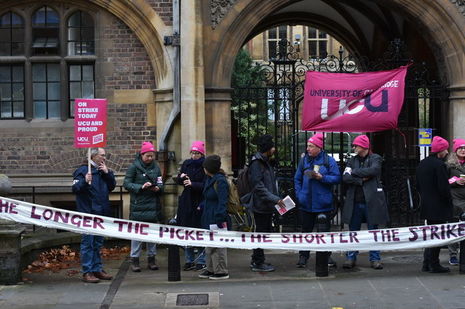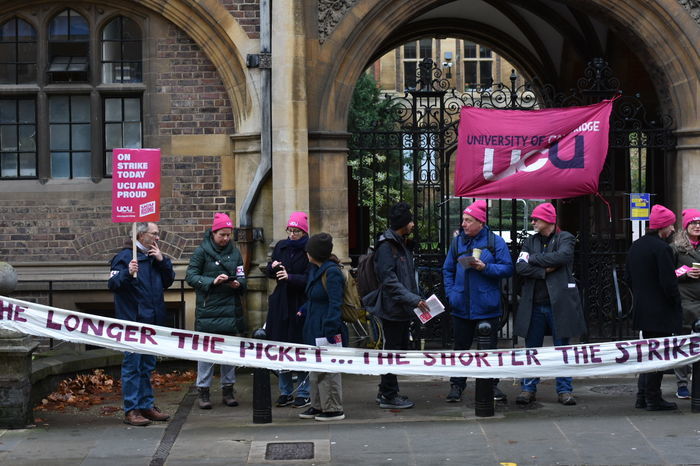Some supervisors’ effective pay rate £3 below living wage, new report finds
Less experienced supervisors claimed it took them over 7 hours to prepare for supervisions

Some supervisors are paid an effective hourly pay rate £3 below the national living wage, a new supervisor workload report has found.
These findings come amid ongoing negotiations between the University and the supervisors' union, after a boycott threat was called off in October.
The report, published by the Office of Intercollegiate Services (OIS), was the largest of its kind with almost 35% of current or recent supervisors participating in the survey.
The report found the median amount of time supervisors spent to prepare, set and mark work for a supervision group of 5 students to be nearly 5 and a half hours. Supervisors are typically not paid for preparatory time, but for the supervision hour alone.
Supervisors pay varies according to the size of the group, with the hourly rate for running a session with 5 students set at £50.90. This means that when a preparation time of over 5 hours is combined with the supervision hour, these supervisors are left with an effective hourly rate below £8.
Some supervisors, especially those with less experience, even reported a typical preparation time of over 7 hours for a supervision of 5 students.
In their comments on the workload survey, the OIS expressed “concern at the significant spread of variance” in the time input of supervisors. They stated that work was needed to achieve a “more reasonable level” for supervisor workload.
The University of Cambridge is an accredited Living Wage Employer, meaning that wages for university staff will “never be lower than the independent benchmark set by the Living Wage Foundation”. The benchmark set by the Living Wage Foundation is currently £12, with the current national living wage being £11.44.
The report follows recent pressure for the University to reform the supervision system. The Justice for College Supervisors (J4CS) campaign had threatened a supervision boycott last Michaelmas. The planned boycott was suspended following a negotiated increase to supervision rates for the 2023-24 academic year.
College representatives and J4CS have met frequently to discuss the undergraduate supervision system. In a joint statement from their latest meeting on the 11th of April, representatives highlighted that work was needed to create a “new pay structure for supervisors”.
A representative for J4CS told Varsity that “the results of the survey prove a simple fact: supervisors are woefully underpaid for their work”.
“The colleges operate a gig economy system and the data proves many supervisors earn close to or below the living wage for their work…the survey proves how far we still have to go before we get a teaching model that is fair for everyone,” they said.
The Cambridge branch of the University and Colleges Union (UCU) echoed these concerns, claiming that the survey “prove[s] that the supervision system is broken, and that working conditions for supervisors are deplorable”.
“The findings about the effective rate of pay for supervisors are particularly shocking, given the high cost of living in Cambridge,” they continued.
A spokesperson for the University of Cambridge told Varsity: “Colleges are currently developing a pay-rate methodology for supervision payments, taking into account the results of the survey.”
“Ongoing discussions between College representatives and members of the J4CS campaign have been very productive. Joint statements of those meetings, and an interpretation of the survey’s findings, can be found on the Senior Tutors’ website,” they added.
 News / Judge Business School advisor resigns over Epstein and Andrew links18 February 2026
News / Judge Business School advisor resigns over Epstein and Andrew links18 February 2026 News / Gov grants £36m to Cambridge supercomputer17 February 2026
News / Gov grants £36m to Cambridge supercomputer17 February 2026 News / Hundreds of Cambridge academics demand vote on fate of vet course20 February 2026
News / Hundreds of Cambridge academics demand vote on fate of vet course20 February 2026 News / CUCA members attend Reform rally in London20 February 2026
News / CUCA members attend Reform rally in London20 February 2026 News / Union speakers condemn ‘hateful’ Katie Hopkins speech14 February 2026
News / Union speakers condemn ‘hateful’ Katie Hopkins speech14 February 2026










